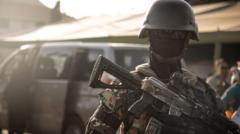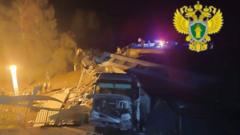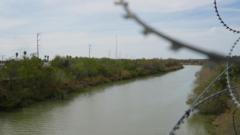The Sahel region of Africa, now accounting for over half of all global terrorism-related deaths, has seen a dramatic increase in violence perpetrated by militant groups. Political instability and weak governance have fostered an environment where jihadist factions thrive, complicating efforts for effective governance and security.
Sahel Region Emerges as Global Terrorism Epicenter with Alarming Death Toll

Sahel Region Emerges as Global Terrorism Epicenter with Alarming Death Toll
New Global Terrorism Index highlights the Sahel's staggering rise in terrorism-related deaths, raising global security concerns.
In a sobering revelation, the latest Global Terrorism Index (GTI) indicates that the Sahel region is now the "epicentre of global terrorism," responsible for over half of all terrorism-related deaths worldwide. The report, released by the Institute for Economics and Peace, states that 3,885 out of a total of 7,555 global deaths attributed to terrorism occurred in this semi-arid area that stretches across ten African nations, including Mali, Burkina Faso, and Niger.
Despite the global decline in terrorism deaths from a peak of 11,000 in 2015, fatalities in the Sahel have surged nearly tenfold since 2019, largely driven by the increased focus of extremist and insurgent groups on the region. The GTI defines terrorism as the use of illegal force and violence by non-state actors to achieve various political, economic, or social goals through fear and intimidation.
The Sahel is home to some of the world’s highest youth demographics, with two-thirds of the population under 25, creating fertile ground for recruitment by militant jihadist organizations. The predominant groups involved in the violence are affiliates of the Islamic State and Jama'at Nusrat al-Islam wal Muslimeen (JNIM), associated with al-Qaeda. Analysts note that these groups are not only competing for territorial control but are also striving to establish legal systems grounded in Sharia law.
Since the onset of political unrest and coups in the region—six successful coups since 2020—governments have struggled to maintain order. Burkina Faso, notably, has topped the GTI's list as the country most affected by terrorism for two consecutive years, an alarming distinction that highlights the deteriorating security landscape. Analyst Beverly Ochieng pointed out that the persistent political instability creates a dire situation for communities, often leaving them with few options but to align with militant factions.
Militant groups in the Sahel often engage in a variety of illicit economic practices, such as kidnappings and drug trafficking, to sustain their operations. The report emphasizes the lucrative nature of these activities, particularly the substantial profits from unregulated gold mining. Additionally, some militant organizations generate income through imposing taxes or providing protection services, effectively entrenching themselves within local community structures.
Following the recent trends, there has been a pivot among Sahelian governments away from Western allies towards support from nations such as Russia and China. The introduction of paramilitary forces from Russia, primarily for training local armies, has not yet yielded significant improvements in combating insurgency.
The GTI warns of potential spillover effects of the violence, with neighboring countries such as Togo already experiencing an uptick in attacks and deaths linked to insurgent activities. Analysts foresee an imminent expansion of militant influence into coastal West African states, highlighting an urgent need for regional and international strategies to address the growing crisis in the Sahel.
The episode in the Sahel underscores the critical need for effective governance, community engagement, and international cooperation to combat the rise of terrorism in one of the world's most vulnerable regions.
Despite the global decline in terrorism deaths from a peak of 11,000 in 2015, fatalities in the Sahel have surged nearly tenfold since 2019, largely driven by the increased focus of extremist and insurgent groups on the region. The GTI defines terrorism as the use of illegal force and violence by non-state actors to achieve various political, economic, or social goals through fear and intimidation.
The Sahel is home to some of the world’s highest youth demographics, with two-thirds of the population under 25, creating fertile ground for recruitment by militant jihadist organizations. The predominant groups involved in the violence are affiliates of the Islamic State and Jama'at Nusrat al-Islam wal Muslimeen (JNIM), associated with al-Qaeda. Analysts note that these groups are not only competing for territorial control but are also striving to establish legal systems grounded in Sharia law.
Since the onset of political unrest and coups in the region—six successful coups since 2020—governments have struggled to maintain order. Burkina Faso, notably, has topped the GTI's list as the country most affected by terrorism for two consecutive years, an alarming distinction that highlights the deteriorating security landscape. Analyst Beverly Ochieng pointed out that the persistent political instability creates a dire situation for communities, often leaving them with few options but to align with militant factions.
Militant groups in the Sahel often engage in a variety of illicit economic practices, such as kidnappings and drug trafficking, to sustain their operations. The report emphasizes the lucrative nature of these activities, particularly the substantial profits from unregulated gold mining. Additionally, some militant organizations generate income through imposing taxes or providing protection services, effectively entrenching themselves within local community structures.
Following the recent trends, there has been a pivot among Sahelian governments away from Western allies towards support from nations such as Russia and China. The introduction of paramilitary forces from Russia, primarily for training local armies, has not yet yielded significant improvements in combating insurgency.
The GTI warns of potential spillover effects of the violence, with neighboring countries such as Togo already experiencing an uptick in attacks and deaths linked to insurgent activities. Analysts foresee an imminent expansion of militant influence into coastal West African states, highlighting an urgent need for regional and international strategies to address the growing crisis in the Sahel.
The episode in the Sahel underscores the critical need for effective governance, community engagement, and international cooperation to combat the rise of terrorism in one of the world's most vulnerable regions.




















